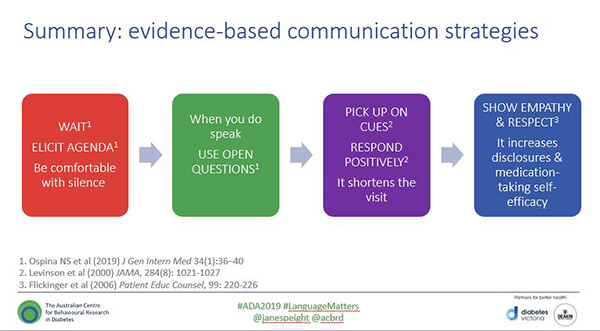ADA Scientific Sessions (#ADA2019): Loads of Learning, Connecting and Recommitting

I wrote this invited guest blog for the American Association of Diabetes Educator’s (AADE) blog after attending the 2019 American Diabetes Association’s (ADA) Scientific Sessions (as they're called) in June. As usual this conference was packed with four days of intense learning. It also offered an opportunity to connect with many old friends and colleagues as well as with many healthcare providers, people with diabetes and others committed to improving diabetes care and the lives of people with diabetes. The slide above was created by Professor Jane Speight from Australia. She graciously revised this slide for me to share with my AADE colleagues in this blog. She used the initial draft of the slide in her talk at ADA on #languagematters which I recapped in this blog. She's a global champion on this topic.
How Does SPLENDA® Fit into a Diabetes Diet Plan?
 With all the myths and media hype about low-calorie sweeteners that are swirling around, if you are a person with diabetes, I bet you wonder if you’re wise to use them. As a long time dietitian and diabetes educator with extensive expertise in the research and practical use of low-calorie sweeteners, it’s important to me that you have accurate knowledge on this topic.
With all the myths and media hype about low-calorie sweeteners that are swirling around, if you are a person with diabetes, I bet you wonder if you’re wise to use them. As a long time dietitian and diabetes educator with extensive expertise in the research and practical use of low-calorie sweeteners, it’s important to me that you have accurate knowledge on this topic.
Making the Grade: Back To School With Diabetes
 As a parent or caregiver of a child with diabetes, your back-to-school checklist includes more than a backpack, notebooks and writing tools. You also have to add visits to your child’s healthcare providers, forms to complete, supplies to provide, and connecting with the school personnel to your list.
As a parent or caregiver of a child with diabetes, your back-to-school checklist includes more than a backpack, notebooks and writing tools. You also have to add visits to your child’s healthcare providers, forms to complete, supplies to provide, and connecting with the school personnel to your list.
Diabetes Alert Day 2015 - At Risk? Take Action NOW!
 Tuesday March 24, 2015 is the American Diabetes Association's (ADA) annual Diabetes Alert Day. This day kicks-off a four-week campaign which runs through April 21, 2015.
Tuesday March 24, 2015 is the American Diabetes Association's (ADA) annual Diabetes Alert Day. This day kicks-off a four-week campaign which runs through April 21, 2015.
Diabetes Alert Day is THE day each year that ADA sets aside to alert the public to the Diabetes Risk Test. If the results of your risk test indicates you'r at risk, take the next step to know for sure. The goal is for you or your loved one to TAKE ACTION to get diagnosed and care for prediabetes or type 2 diabetes.
I wholeheartedly support this effort. The time for action is now!
The statistics about the prediabetes and type 2 diabetes epidemics are alarming enough to sound the alarm 365 days a year. They show the dent diabetes is making and will continue to make on our health care system, let alone peoples’ lives and longevity!
According to CDC's Diabetes Facts:
- 29 million children and adults are living with diabetes. (This includes about 6 million people who currently have diabetes but have not yet been diagnosed.) Based on the current U.S. population, about 314 million people - roughly 9.5%.
- 86 million people are estimated to have prediabetes placing them at a much greater risk for developing type 2 diabetes. CDC estimates that’s about 35% of all adults over the age of 20 and 51% of adults over 65 years of age (yes, you read that correctly!). Research from CDC shows, unfortunately, that barely 11% of these people know they have it.
- One in three American adults will have diabetes in 2050.
Top 10 Take Aways from ADA 2013 – Part Two
 I recently attended the 73rd American Diabetes Association (ADA) Scientific Sessions in Chicago, June 21-25 where brilliant and dedicated researchers and health care professionals from around the globe gather to learn, share and connect. As a diabetes educator involved in the diabetes field nearly 35 years and counting, I was once again wowed by this meeting...and learned a ton!
I recently attended the 73rd American Diabetes Association (ADA) Scientific Sessions in Chicago, June 21-25 where brilliant and dedicated researchers and health care professionals from around the globe gather to learn, share and connect. As a diabetes educator involved in the diabetes field nearly 35 years and counting, I was once again wowed by this meeting...and learned a ton!
Though tough to choose, here are my top 10 take aways from the 2013 ADA meeting - divded into Part One and Part Two:
6. Delivering Improved Diabetes Care and SUPPORT Using Technology: It’s been said before and was said again and again this year, people with diabetes (and prediabetes) need ongoing and consistent support. As Marti Funnell, MS, RN, CDE said, “If we don’t address the emotional side of diabetes we won’t ever improve outcomes. It is an imperative!” And as Ed Fisher, PhD, of Peers for Progress (link) said, “Humans have fundamental need for support and social connections.” People not only need emotional support to manage this disease, but research clearly shows that to make the necessary health behavior changes and implement the management strategies for good control, people also need support. See #10 – The DOC.
The good news is today we have technologies, from Skype, to online systems, to tracking devices, telehealth tools, and more to come in the future, to incorporate important support systems. And numerous studies presented at ADA again showed that people do better with support…and that we can deliver this conveniently to people and more cost effectively.
Top 10 Take Aways from ADA 2013 – Part One
 I recently attended the 73rd American Diabetes Association (ADA) Scientific Sessions in Chicago, June 21-25 where brilliant and dedicated researchers and health care professionals from around the globe gathered to learn, share and connect. As a diabetes educator who’s been involved in the diabetes field nearly 35 years and counting, I was once again wowed by this meeting...and learned a ton!
I recently attended the 73rd American Diabetes Association (ADA) Scientific Sessions in Chicago, June 21-25 where brilliant and dedicated researchers and health care professionals from around the globe gathered to learn, share and connect. As a diabetes educator who’s been involved in the diabetes field nearly 35 years and counting, I was once again wowed by this meeting...and learned a ton!
Though tough to choose, here are my top 10 take aways from the 2013 ADA meeting - divded into Part One and Part Two:
1. DCCT/EDIC Results Heralded: A highlight of ADA was celebrating the 30 year anniversary of the landmark type 1 study, the Diabetes Control and Complications Trial. This trial was designed to answer the questions: Does good control matter? The DCCT began in 1983 and the conclusions were unveiled at the 1993 ADA meeting (I still remember the thrill of hearing the results live!). These results showed a reduction in the early stages of diabetes complications (eye, kidneys, etc.), by up to 76% compared with so-called “conventional therapy” – two shots of insulin a day.


